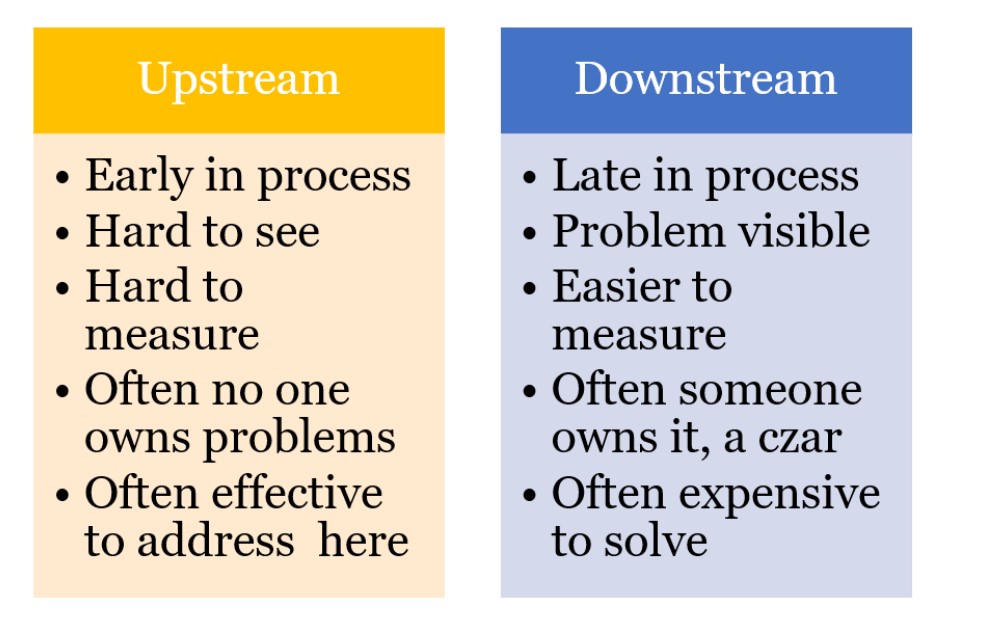Dan Heath has a book on solving problems upstream. The central idea is that it is better to solve a problem nearer its source than try and solve the problem once it has fully manifested. Heath’s hard-to-disagree with advice is that it is better to stop the horror movie monster being conjured rather than having to stake them after they appear.
Upstream And Downstream
The basic upstream versus downstream distinction is a useful one.
Upstream is near the source of a problem. Thus, when tackling a medical problem solving it upstream would be seeking to prevent the problem from happening. To deal with high blood pressure one might try and induce healthy eating habits in schools.
Downstream is once the problem has manifest. So, this might involve working with people who already have a problem they are concerned about. (Or a problem that they should be concerned about).
Downstream Problems Are Easy To See And Measure Achievement Against
The challenge with solving problems upstream is that the downstream is so much more concrete. We can see the problem. If you solve a problem before it becomes a problem this is fantastic but no one ever sees your achievement. You won’t get any credit, and you probably won’t be able to make a living solving problems no one else has thought about yet. Heath describes the disaster averted as the world avoided. What we avoided can represent a great achievement but who gets a plaque for solving a problem that didn’t occur?
When you solve a problem you can see, i.e., downstream, you get nice metrics of success. Burglars arrested is a much clearer number than burglaries that didn’t happen because of your upstream policing efforts. It is usually much better for everyone to deter burglaries than arrest people after they do the burglaries. Still, there is much more money devoted to arresting as once the problem is obvious, and houses are being broken into, then people will commit funds to a solution, i.e., arresting burglars.
But with upstream efforts, success is not always self-evident. Often, we can’t apprehend success directly, and we are forced to rely on approximations – quicker simpler measures that we hope will correlate with long-term success.
Heath, 2020, page 153

Knowing What To Focus On
A challenge occurs in knowing what to focus on. You cannot work on everything that is far upstream. There is just so much upstream you could do. You also have downstream problems happening now that are more pressing. What is more, not all problems that could occur, will occur. Nor will they all be terrible if they do occur.
When everything is a cause for alarm, nothing is cause for alarm.
Heath, 2020, page 145
What to focus on will come down to judgment. Heath’s sensible advice is to concentrate on things you can do something about. Why worry if you can’t do anything about it either way? Also, you can accept more risk of a false positive (worrying when you don’t have to) for some problems than others. This is intuitive. You should worry more about massive problems and take more (potentially unnecessary) precautions to avoid them than you would to avoid something that is anyway not a big deal should it happen.
The Cobra Effect
He gives an example that I’ve seen before but is a good one. (I assume it is true but it is a great tale either way). The story is that the British imperial authorities paid a bounty on Cobras in India in the hope of eradicating these dangerous snakes. People started to breed them, as they could make good money selling the British dead snakes. Realizing their error the British stopped paying. There were a load of cobras bred to be killed for a bounty that simply weren’t killed. Instead, breeders just dumped the snakes. There were now many more cobra slithering about after an ill-judged plan to get rid of them.
The message is to be careful with your upstream interventions. Try and make sure the interventions will do what you want them to do.
Solving Problems Upstream
Heath’s basic advice makes a lot of sense. We spend vastly more time and money treating problems after they occur rather than preventing the problems in the first place. More upstream thinking would be very welcome.
For more by the Heath brothers see here.
Read: Dan Heath (2020) Upstream: The Quest To Solve Problems Before They Happen, Avid Reader Press
